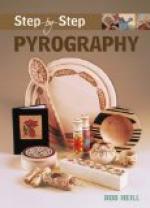The first time that Tammuz ever entered the castle was on the night of the grand boar-hunt after the marsh was drained, when Sir John Courtenay, Sir Guilhem de Grantmesnil, Sir Yves de Vescey, and King Henry himself with several of his courtiers, went forth to slay the monster of the marsh, and the head of the three-hundred-pound brute was borne in triumph into the hall. The second time was on a dark night a little later, when he slipped in at the gate, no one knew how, and asked to see Sir Walter Giffard.
It was a serious tale he had to tell. The Welsh were on their way to invade England, knowing that the King was between Shrewsbury and Chester and had no very great force with him. Tammuz was among the disaffected peasants who had been relied upon to aid the enemy. But for a long time now he had had growing doubts about lending his aid to such work. He was neither blind nor foolish, and he could not help seeing that the people of the farms and hamlets dwelt in greater security and comfort than they ever had before that he could remember. He was well aware also that if the Welsh crossed the border the lords of the frontier castles would suffer, whoever else did or did not. When Tammuz thought of the brave and spirited little maiden who had had pity on the woodcock her falcon killed, and her gracious mother who had nursed sick children and heard the troubles of the poor, ever since she came to that rude land, he did not like to think of the torch and the pike of the half-barbaric Welsh let loose upon the valley. Therefore he had finally made up his mind to come and warn his lord of the peril in good season.
The knight wasted no time. He sent swift messengers to rouse the neighboring castles, armed guards turned out to patrol the marches, another messenger rode eastward to call the King and his troops to the threatened border. Moreover, the Norman lords did not wait for invasion; they made the first move themselves. They had no mind to risk their people and their homes if the thing could be avoided. Thanks to Tammuz, they knew in what direction the enemy might be expected, and some of the Welsh chiefs, seeing what was afoot, refused to join in the war at all.
The actual trial of strength took place on bare moorland some ten miles from the castle of the Giffards. From the battlements it was possible to see in a very distant way what went on. Lady Philippa, Eleanor and Roger stood together at a high window, and saw morions glitter in the sun, lances ranged like an orderly mass of reeds, and at last the King’s banner dipping and lifting over the uneven ground as his reenforcements rode up. Then far through the fine cold air came trumpet-calls, and the enemy emerged from their cover in the woods. In comparison with the disciplined and controlled forces of the English, they seemed a motley rabble. Moreover, the Norman crossbowmen and the English archers with their long bows had the pike-bearing Welsh at a terrible disadvantage. This Roger explained, hopping with excitement, for he was full of information gathered from Ralph the bowyer, his firm friend.




